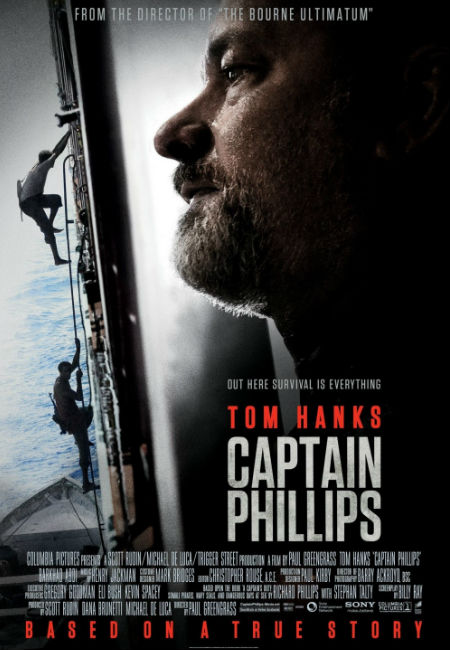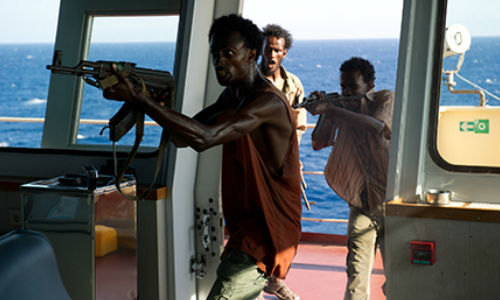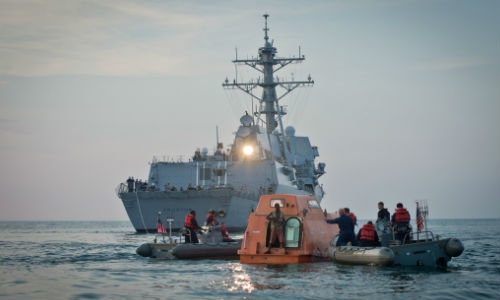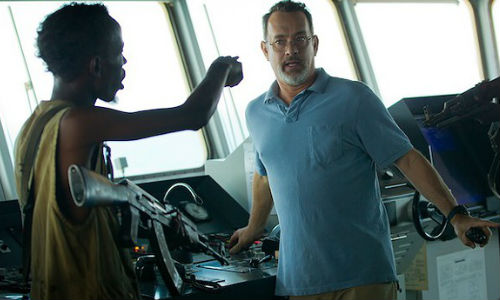
It is an oft used axiom that there are always two sides to every coin.
But mainstream movie makers have not always been quick to honour this truism, often preferring to render their protagonists as all-capable three dimensional beings for whom no task is too great and no victory too unattainable, and their antagonists as cardboard cutout cartoonish villains whose only reason to exist is as faceless, and ultimately, hapless foils for “The Good Guys”.
Thankfully, and he proves it once again with Captain Phillips, Paul Greengrass is not one of those filmmakers, choosing to craft well-rounded tales that dabble in the greys and give voice to both sides while delivering a whip-crackin’ edge-of-your-seat tale.
His task in this case was aided in no small part by a deliberately understated but nevertheless powerful performance by Tom Hanks who brings an everyday man quality to his role as Captain Rich Phillips, a family man who stood in the breach when the cargo ship he was commanding, Maersk Alabama, was boarded by four Somali pirates, led by Abduwali Muse (Barkhad Abdi), en route to Mombasa, Kenya.
From the opening scenes driving to the airport with his wife Andrea (Catherine Keener), where talk, sporadic as it is, turns to the sort of uncertain and hostile world their children are entering through to his arrival at the ship in Salalah, Oman, Phillips is portrayed as a man not prone to histrionics or reckless displays of heroism or bravado.
Or it must be said too beholding to the sort of social niceties that grease the oil of working relationships on board a large cargo ship.
Certainly not your regular hero type at all, a sign that Greengrass is trying to root his dramatisation of the hijacking that captured worldwide news in as much realistic detail as possible.
Of course not even Greengrass can resist the pull of a hero’s tale, even an embellished one, and Phillips is given the aura, despite the sense of authenticity the film carries with it, of a selfless man willing to give his life up for his crew.
It is a portrayal at odds with tales of the real Rich Phillips, who was described by his crew in a New York Post article and CNN interview as a man prone to breaking the rules on a regular basis, a captain who showed scant regard for the welfare of his crew by ordering them to sail too close to the dangerous Somlai coast, putting them right in the path of pirates.
Whatever the veracity of these claims, and doubtless Greengrass has polished Phillips’ halo somewhat since a vain glorious, arrogant man would not have a good hero made, the Rich Phillips of the movie is not made out to be a saint, coming across as somewhat aloof from his men and thoughtfully considered to the point of being almost too slow to react.
But react he does, and as the pirates board his ship, he sends the men under his command to hide in the bowels of the engine room while doing his best to delay, thwart and frustrate the pirates where he can.
He is no John McClane however, his reactions consistently those of an ordinary man in extraordinary circumstances, doing his best with the limited means at his disposal to ensure the safety of his men, and as the tale unfolds, his own survival.

What gives the film a real air of gritty reality, apart Hanks’ studied performance, and the unwavering documentary style of the film which gives you the sense you are watching the action unfold in real time with all the quietly bubbling tension that entails, is that Greengrass has chosen to render Phillips’ opponents as real men desperate for a shot at a better life.
That they have chosen piracy as a means to effect that is not shown as the act of men too lazy to consider other options, but of people backed into a corner by the grinding poverty and political disorder of their fractured homeland.
Fishermen denied a chance to pursue their livelihood by foreign trawlers that took advantage of the breakdown of central government in the Horn of Africa nation to suck the coastal waters dry of viable marine life, they still need to feed their families, competing vigorously to be picked by the local warlord’s henchmen to go on the raid.
Their act of criminality therefore is borne of desperate need, and you’re given a chance to see how much rests upon the successful completion of their assigned mission.
Greengrass is careful not to confuse sympathy for these men’s motivations with approval of their actions, focusing on what drives them to do what they do rather than casting a rose coloured politically correct glow over their acts of violence and intimation.
The leader Muse, for instance, whose reasonable command of English automatically confers on him the status of interlocutor between Phillips and the fractious group of men he leads, simply wants to go to New York and “buy a car”, and responds to Phillips’ assertion that there must be another option besides fishing and piracy with “maybe in America, Irish, maybe in America”.

That the pirates can’t possibly win given the formidable military force arrayed against them is almost immediately obvious but it doesn’t detract from a fully three dimensional power struggle between the two parties (image via heyuguys.co.uk)
It is he most of all who represents the desperate hope that drives these men, who include a young man the same age as Phillips own children, a powerful motivator which drives them to undertake the kinds of foolhardy risks which underpin much of the narrative in the film.
Violent though they are at times, they are not buffoonish Bond villains, stripped of recognisable humanity, and Captain Phillips works all the better because of it.
While the momentum of the film does lag at times, with the lifeboat scene in particular dragging on a little longer than was probably needed, the movie is by and large a taut gripping thriller with a very real human centre, the action seeming to unfold in real time with tension coming from the slow unravelling of events as they most likely would have played out.
There is no quick resolution to the hijacking or the abduction of Captain Phillips, with neither party attaining the upper hand quite as quickly or decisively as a more conventional action thriller would have required.
That the Americans triumph in the end, thanks to their considerable superior military power is a matter of public record and expected, but Greengrass takes care to take us on a journey before this inevitable conclusion, one that resonates with understandable humanity and realistic action, positioning Captain Phillips in the process as one of the more thoughtful, nuanced movies of the year.
It is all the more of a triumph considering the genre it inhabits, reaffirming Greengrass as one of the most insightful filmmakers of his generation and Tom Hanks as a real Oscar contender in 2014.
